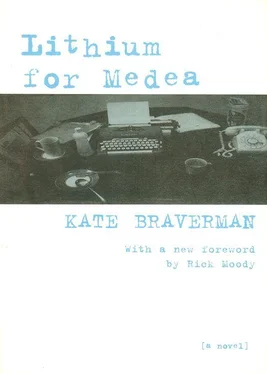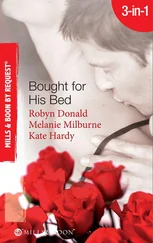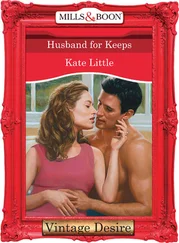But I was impatient. I wanted to ask her about the farm, the village in Poland, the Cossacks, her sea journey to America. I wanted to ask her about our mothers and the orphanage, the foster homes. I wanted my history all nice and complete, a series of answers filled in like the openings left in certain questionnaires, dates and places clearly designated, a matter of checking the appropriate boxes. I wanted the map colored in. Did I tell you I wanted warm-from-the-oven butter cookies in round printed tins?
The darkness spread like a wound in soft flesh. After a while she let me babble, let me ramble about what grew on the farm in Poland and did she pull water from a well and how did that city New York first seem to her startled eyes fifty years ago?
Suddenly she flicked on the light switch. For an old bent woman she moved with astonishing speed. She reached easily across the table to the wall and flicked on the light to cockroaches. Everywhere. Cockroaches crawling across her kitchen walls, hopping across the bread and sugar in their shined and polished tin containers.
I screamed. I tried to leave the room, the walls of curling black roach legs, curling red roach legs, waves of roaches, a sea of sickening insects making their tiny insect sounds, sounds like distant stars slowly sizzling and sinking in their own terrible bloated heat.
Grandmother Rose gripped my wrist. “Look,” she commanded. Her voice was powerful and full as the imperatives shouted by the dead. “See them dance?” She smiled at the black walls. “All these years,” she sighed. “My only friends. All these years when no one comes to see me. No one.” She stared at me. “You wanted to know,” she said softly. There was something sharp and cunning in her voice. “They say I’m crazy. They’re afraid of me. But you came. You knew I had secrets. But you wanted to know about the farm. The times I carried the trays. The afternoons when the little girls came and sat here with me.”
“Please let me go,” I screamed.
My grandmother looked at me. She shook her head from side to side, sadly. “So afraid,” she observed. “You’re so afraid.”
A cockroach crawled across my arm, the arm my grandmother was holding. She studied me. “See them dancing?” She was staring at the walls, measuring something. “The stragglers,” she sighed. “The frightened black ones? The babies? See how they play, my little friends?”
I was still screaming. “You wanted to know about my life,” she said again. She threw back her head and laughed. Then she let go of my arm.
I ran out through the living room, past the three stacks of wrapped gifts, past the calendar, the red paper heart and the altar. I ran into the dark tiled corridor where drums were beating behind closed doors and radios were blaring and her voice was ricocheting somewhere behind me like a bullet. “They dance,” she was screaming. “Remember this.”
Her voice followed me as I ran down the steep stairs. Her voice bounced and echoed across the tiles in some horrible and final benediction.
Rachel, I’m telling you this because I left my gifts there on the table in her kitchen. The same kitchen where our mothers came on the subway from the orphanage on Sundays and helped her trace the exact route from Krakow to New York while she studied the map and cursed half the world. I left my gifts there and I have always regretted it.
Time is a cymbal crashing, crashing. I’m sorry but I won’t be able to write to you for a while. In part I am afraid you will one day tell me of becoming a college student, of discotheques and boys with beer and grass. I’m afraid you might develop a fascination for the succession of European kings, border disputes in the fifteenth century, Middle English or Mayan art. They all mean something. It just isn’t enough. Not nearly.
There are crevices in the mural that is the world. There are moments when the individual times/time/cells open suddenly. Those are the moments that matter. When I sat with our grandmother in her kitchen and she suddenly flicked on the light switch, that was such a moment. If I could do it again, I would do it differently.
I am enclosing our grandmother’s address.
May we both find fair winds and safe harbors.
I folded the letter into an envelope. What was left? Sofas and chairs? They were simply shells, substance removed, anonymous. Jason could keep them. After all, I hadn’t even given him two weeks notice.
I drove north on the Pacific Coast Highway to Sunset Boulevard. It was the longer route. Waves beat their black backs below me, below the gouged rubble of coastal cliffs, those slow-falling terminal victims of windlash and mud slides. The cliffs would feed the sea in time, in time. The night was dark, clear and sharp. I wasn’t in a hurry.
I followed Sunset Boulevard inland where it curved itself between hills and sudden gullies. I felt the sea beating behind me, waves curling on shore and withdrawing, waves clawing at the shore and leaking out spent. Crash and foamy silence. Crash and sudden silence. And if Caroline Murphy was the first and Picasso the second, the old man with the mandolin, wood reddish and fine like a stretched heart, was the third and it was enough. It was over.
I took the cardboard boxes out of my trunk, one by one. Francine took a long time to answer the door. She did a double take.
“It’s after midnight.” She pulled the folds of dark green silk close to her neck. She stared at the cardboard boxes as I dragged them through the living room.
A stiff-looking balding man sat on the tufted tan living room sofa. He was buttoning his shirt as I walked in. He tried not to look at me, tried to somehow disappear, blend in with the oyster grays and eggshell whites. He reached onto the wide cocktail table and picked up a glass. He held it tightly in his hand and stared into it as if trying to connect to something. I walked past him, pulling the boxes with me.
“Make it quick,” Francine whispered. “What’s wrong? Not your father?”
“No.”
“Because I just called the hospital. They’ve taken him off the critical list. It’s going to be like the other time, at Jefferson Hospital. You wouldn’t remember. You were only three.”
“I was six.”
“Not so loud,” Francine said quickly. “Anyway, he got better so fast last time. He used to grab the head nurse. He pinched her ass every time she walked in. They barred him from the hospital. They said no matter what ever happened, he could never be admitted to Jefferson Hospital again.”
We were sitting in my mother’s bedroom. The walls were tan.
The lamplight made everything seem rose-tinged. The door was closed.
“Well?” Francine studied me out of the corner of her eye. She lit a cigarette. She placed her hands on her hips, graceful, formidable.
“I need money.”
“Tell me something I don’t already know.”
Francine seemed relieved. Maybe it was something that could be handled simply, quickly. She had put in a big day. The hospital in the morning. A lunch conference. A budget session. There was the stiff balding man downstairs. And now me, still eight years old and helpless, afraid of everything, the thick slats of palm trees, the huge gouged sun, my afternoons alone.
My mother opened a drawer. She removed an envelope and sifted through a green stack. She extended a fifty-dollar bill in my direction. It was new and crisp. It made a small snapping sound between her fingers.
“I need more.”
“How much more?” Francine looked as if she was starting to sober up.
“What am I worth?” I opened my purse. It appeared that we were going to play seven stud high. I extracted items from my pocketbook. It was my bet. “Here’s the ring, the bracelets and the stock.”
Читать дальше












